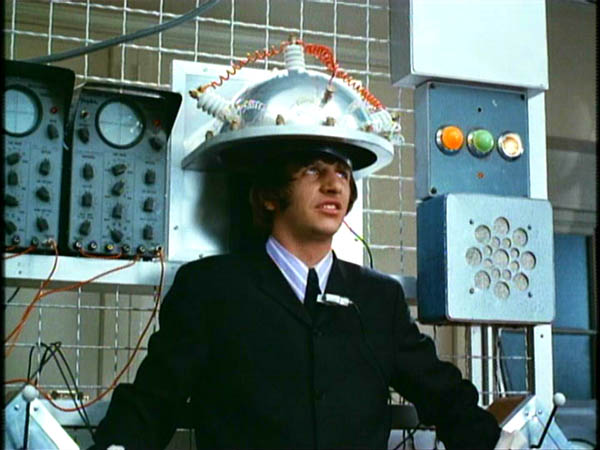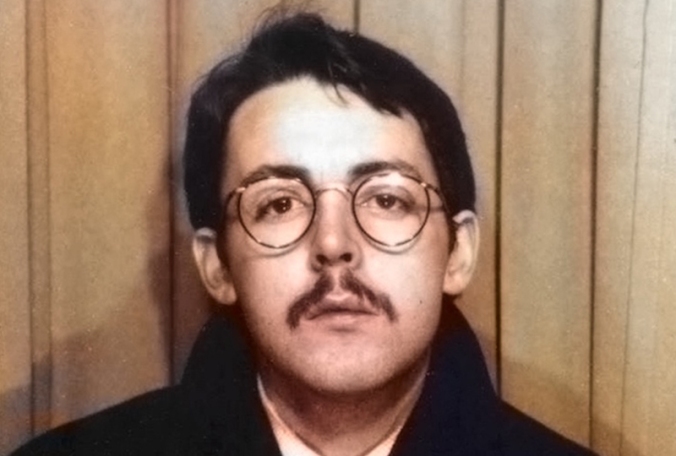ACCORDING TO URBAN LEGEND Paul McCartney died in an automobile accident on November 9, 1966.*
He didn’t notice that the lights had changed, I guess.
28 IF…
The story goes, The Beatles, not wanting to lose millions of dollars break up the band, secretly replaced the departed McCartney with a (assuming equally musically- inclined) doppelganger named William Campbell Shears.
…and nobody knew the difference.
Almost nobody.
William — or Billy — Shears became Paul and the Beatles continued to make records, all the while dropping hints to their legions of devoted fans that Paul was not, in fact, Paul.

WE KNOW, RINGO…WE KNOW
The naysayers will tell you that the story of Billy Shears ain’t true, but we — the TRUE FANS — know the truth:
PAUL IS DEAD
That guy on the cover of Sgt. Pepper’s Lonely Hearts Club Band — NOT PAUL.
The guy who sang “Hey Jude” — NOT PAUL
The guy who sang with Wings — NOT PAUL.
That dude who sang “Ebony and Ivory” — DEFINITELY NOT PAUL.
To this day, Faul McCartney continues to fake Paul.
…or as some of us call him, FAUL McCartney.
FAKE + PAUL = FAUL

Faul McCartney might look, act, and sound like the real Paul McCartney — and even though Faul has been Paul McCartney longer than the real Paul was Paul McCartney — he still isn’t Paul. He won’t be. NOT EVER.
They may look the same, but they are not the same.
And folks, if you think I’m going philosophical on this one, yell “bingo!”

You see, ladies and gentlemen, whenever we say something like, the Paul you see isn’t the real Paul McCartney we’re talking about who Paul McCartney truly is; his identity.
and if you’re into philosophy, you’d say PERSONAL IDENTITY.

PROBABLY PAUL
So…what is personal identity? According to the Stanford Encyclopedia of Philosophy (SEP), personal identity
deals with philosophical questions that arise about ourselves by virtue of our being people (or, as lawyers and philosophers like to say, persons).
One question we ask when we talk about personal identity is WHO AM I (and how do we know)?
Well… if I were the English philosopher John Locke (1632 –1704) I would say that who we are — our personal identity — has something to do with a little thing called psychological continuity.
In An Essay Concerning Human Understanding (1689), Locke describes psychological continuity as the continuous chain of collected memories or continuity of character. That means, Paul knows he’s Paul because he remembers his youth in LIverpool and his day-to-day experiences as “Paul McCartney”. Paul’s character traits, including his infamous unrelenting control freakery and studio perfectionism (hey, everybody else’s words, not mine) persists over time.
Paul knows Paul is Paul because Paul feels like Paul.

ALTHOUGH FAUL FELT ENOUGH LIKE PAUL TO WRITE PENNY LANE
But here’s the hitch with that…
Locke’s definition of personal identity works until we consider the fact that mere memory of past experiences doesn’t necessarily answer the question who am I (and how do I know)? After all, it’s not difficult to imagine fantastic brain scientists (or surviving band mates) implanting memories of a person’s life in someone else’s brain.

PICTURED: MEMORY IMPLANTATION

YOU ARE HERE
Materialism is a form of philosophical monism which holds that matter is the fundamental substance in nature, and that all things, including mental states and consciousness, are results of material interactions. According to philosophical materialism, mind and consciousness are by-products or epiphenomena of material processes (e.g. the biochemistry of the human brain and nervous system) without which they cannot exist. This concept directly contrasts with idealism, where mind and consciousness are first-order realities to which matter is subject and material interactions are secondary.
Paul is Paul because Paul’s brain thinks it’s Paul.

YOU ARE YOUR BRAIN WORKS FINE UNTIL YOU REMEMBER THIS IS WHERE PAUL’S BRAIN WAS ON NOVEMBER 9, 1966
Ok… You are your brain sounds convincing. And if we think about the case of Phineas Gage* you-are-brain makes perfect sense.
BUUUUUTT…
Although fantastic brain scientists can show us all sorts of fancy brain scans of neurons and other complex brain stuff, science can’t tell us exactly where “I” is located in the brain. A brain injury (like Phineas Gage) or a brain disease (like Alzheimer’s or Mad Cow Disease) can disturb continuity of one’s character.
…So can falling flower pot-induced amnesia.
If my brain is injured by a hit on the head by a falling flower pot and forget who I am, am I still me? Is Paul Paul?
If, following a deadly car crash that actually killed Paul McCartney, fantastic scientists and unscrupulous band mates created an exact replica of Paul McCartney — a genetically indistinguishable duplicate that thinks and feels like the “real” Paul — is that Paul Paul and not Faul?

SERIOUSLY!!! WHO IS THIS GUY?!?!???
Alright…if we can’t answer the question who am I (and how do I know)? with psychological continuity or by pointing to our brain (aka, the materialist response), how do we answer the question?
How do we answer who am I (and how do we know)?
More importantly, how can we tell if Paul is Faul?

NO, NO WAY. NAH. WE AIN’T GOING THERE.
Honestly folks — and don’t let anybody tell you different — philosophers and neuroscience are still trying to solve the question of personal identity, Some folks insist the answer to the question who am I (and how do we know)? is psychological; others say it’s physical. And others say the answer is literally up in the clouds.


28 IF, folks… 28 if…
* IF YOUR’RE INTERESTED IN THE PAUL IS DEAD MYTHOLOGY, READ: https://en.wikipedia.org/wiki/Paul_is_dead or, https://www.snopes.com/fact-check/paul-is-dead/
MORE ABOUT THE CASE OF PHINEAS GAGE: https://en.wikipedia.org/wiki/Phineas_Gage
SOURCES:
